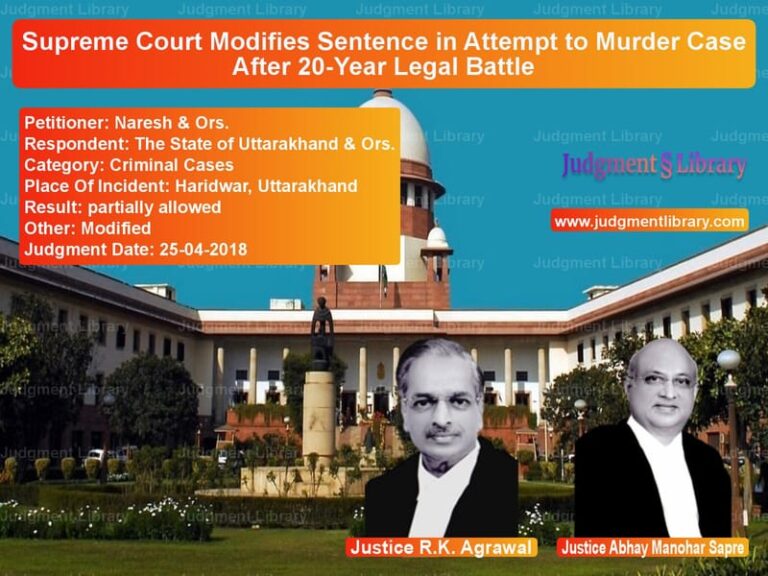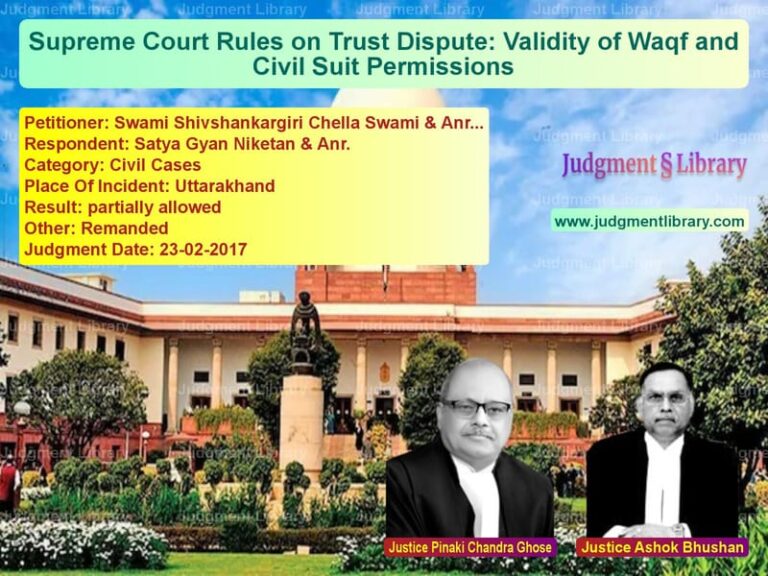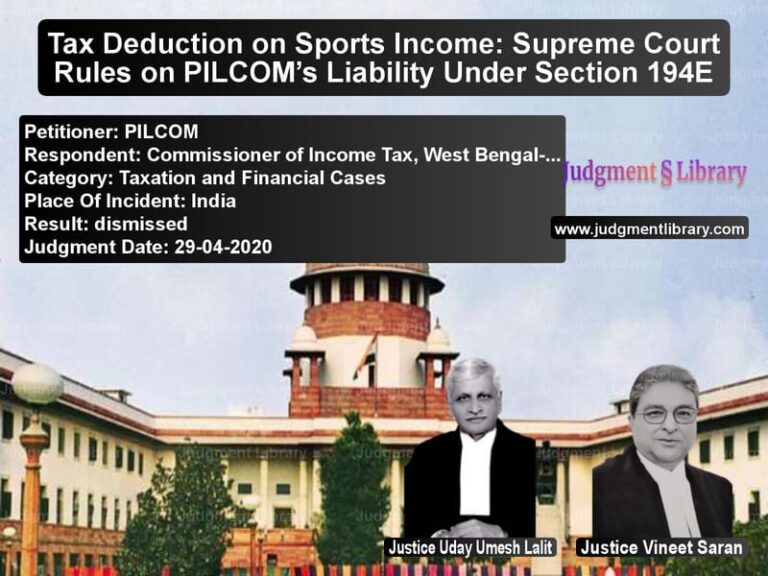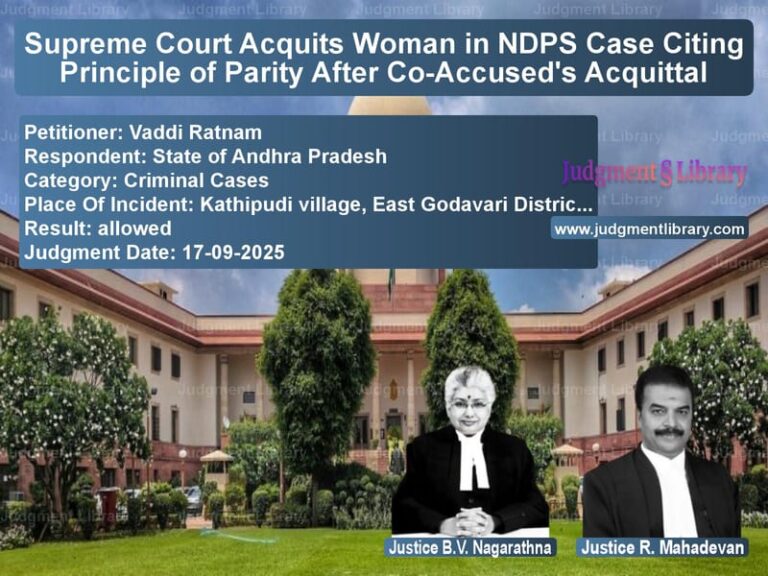Supreme Court Cancels Bail of Accused in Rape Case Over Threats to Victim
The Supreme Court of India has quashed the bail granted to the accused in a rape case, citing concerns over intimidation of the victim and misuse of bail privileges. The case, Ms. P. vs. State of Madhya Pradesh & Another, involved allegations of rape under the pretext of marriage, forced abortion, and subsequent threats to the victim after the accused was released on bail. The ruling highlights the judiciary’s firm stance against granting bail in cases where the accused is likely to influence witnesses or compromise a fair trial.
Background of the Case
The case was filed by the appellant, Ms. P., against the accused under Sections 376(2)(n) and 506 of the Indian Penal Code (IPC). The victim alleged that the accused had deceived her into a sexual relationship by falsely promising marriage and later forced her to undergo an abortion. Despite her complaint, the Madhya Pradesh High Court granted bail to the accused, prompting the victim to challenge the decision before the Supreme Court.
The timeline of key events:
- July 2019: Accused applies sindoor (vermilion) on the victim’s forehead, convincing her they are married.
- July 2020: Victim becomes pregnant; accused and his sister force her to undergo an abortion.
- June 21, 2021: FIR registered under Sections 376(2)(n) and 506 IPC.
- August 10, 2021: High Court denies anticipatory bail.
- September 13, 2021: Supreme Court rejects the accused’s plea for anticipatory bail.
- October 25, 2021: Charge sheet filed against the accused.
- November 16, 2021: Madhya Pradesh High Court grants regular bail to the accused.
- May 5, 2022: Supreme Court cancels bail and orders the accused to surrender.
Key Legal Issues
- Whether the High Court erred in granting bail despite serious allegations.
- Whether the accused’s actions post-bail posed a threat to the victim’s safety.
- Whether the accused’s criminal antecedents justified cancellation of bail.
Arguments by the Petitioner (Victim)
The victim argued that:
- The accused deceived her into a sexual relationship by falsely promising marriage.
- She was forced to undergo an abortion without her consent.
- After securing bail, the accused publicly celebrated his release, intimidating her and her family.
- The accused and his father had multiple prior criminal cases, making him a threat to the victim.
Counterarguments by the Respondent (Accused)
The accused contended that:
- The relationship was consensual and no false promise was made.
- The victim filed the complaint months after the alleged incidents, which raises doubts about its credibility.
- The posters welcoming him after release were related to a religious festival and not meant to intimidate the victim.
- The case was being used as leverage to force him into marriage.
Supreme Court’s Observations
1. High Court Granted Bail Without Justifiable Reasoning
“The High Court has made short shrift of the submissions made by the prosecution counsel and has overlooked material evidence against the accused.”
The Court criticized the High Court for failing to account for the gravity of the allegations.
2. Intimidation of Victim Post-Bail
“The accused’s conduct post-release, including celebratory posters and public processions, demonstrates his intent to influence the victim and compromise the trial.”
The Court noted that allowing the accused to remain free could endanger the victim and key witnesses.
3. Criminal Antecedents of the Accused
“The accused has multiple prior criminal cases, making his release a matter of serious concern.”
The Court emphasized that an accused with a criminal history should not be given undue leniency.
Final Judgment
The Supreme Court ruled:
- The High Court’s order granting bail was quashed and set aside.
- The accused was directed to surrender within one week.
- The trial court was instructed to proceed expeditiously with the case.
Impact of the Judgment
This ruling has significant implications:
- Protection of Victims: Ensures that victims of sexual offenses are not intimidated through misuse of bail.
- Higher Scrutiny for Bail: Reaffirms that courts must provide detailed reasoning when granting bail in serious cases.
- Accountability for Prior Criminal History: Prevents habitual offenders from escaping justice due to procedural lapses.
- Legal Precedent: Sets a standard for future cases involving rape under the pretext of marriage.
The Supreme Court’s decision strengthens the judicial system’s commitment to protecting victims and ensuring that accused individuals do not misuse bail to obstruct justice.
Petitioner Name: Ms. P..Respondent Name: State of Madhya Pradesh & Another.Judgment By: Justice N.V. Ramana, Justice Krishna Murari, Justice Hima Kohli.Place Of Incident: Jabalpur, Madhya Pradesh.Judgment Date: 05-05-2022.
Don’t miss out on the full details! Download the complete judgment in PDF format below and gain valuable insights instantly!
Download Judgment: ms.-p.-vs-state-of-madhya-prad-supreme-court-of-india-judgment-dated-05-05-2022.pdf
Directly Download Judgment: Directly download this Judgment
See all petitions in Bail and Anticipatory Bail
See all petitions in SC/ST Act Case
See all petitions in Judgment by N.V. Ramana
See all petitions in Judgment by Krishna Murari
See all petitions in Judgment by Hima Kohli
See all petitions in allowed
See all petitions in Quashed
See all petitions in supreme court of India judgments May 2022
See all petitions in 2022 judgments
See all posts in Criminal Cases Category
See all allowed petitions in Criminal Cases Category
See all Dismissed petitions in Criminal Cases Category
See all partially allowed petitions in Criminal Cases Category







